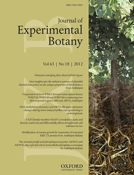
JOURNAL OF EXPERIMENTAL BOTANY
Scope & Guideline
Illuminating the path of plant research innovation.
Introduction
Aims and Scopes
- Plant Physiology and Development:
The journal covers fundamental aspects of plant physiology, including growth, development, and responses to environmental stimuli. Research often explores hormone signaling, metabolic pathways, and the genetic control of development. - Plant Stress Responses:
A significant area of focus is on how plants respond to various stresses, including abiotic stresses like drought, salinity, and temperature extremes, as well as biotic stresses from pathogens and pests. Studies investigate physiological, molecular, and genetic mechanisms underlying stress tolerance. - Molecular and Cellular Biology:
Research articles frequently delve into the molecular and cellular mechanisms that govern plant functions, including gene expression, protein interactions, and cellular signaling pathways. This includes the role of transcription factors and post-transcriptional modifications. - Plant-Microbe Interactions:
The journal emphasizes studies on plant-microbe interactions, including symbiotic relationships (e.g., mycorrhizae and rhizobia) and pathogen resistance. Research often investigates the genetic and biochemical basis of these interactions. - Ecophysiology and Environmental Interactions:
Research exploring how plants interact with their environment, including studies on nutrient uptake, water relations, and the effects of climate change on plant health and productivity. - Plant Biotechnology and Genetics:
The journal includes advancements in plant biotechnology, including genetic engineering, genome editing (e.g., CRISPR), and the development of biotechnological applications aimed at improving crop yield and resilience.
Trending and Emerging
- Plant Resilience and Climate Adaptation:
There is an increasing emphasis on understanding how plants adapt to climate change-related stresses, including drought, heat, and salinity. Research in this area focuses on genetic, physiological, and biochemical mechanisms that enhance plant resilience. - Molecular Mechanisms of Plant Immunity:
Studies investigating the molecular basis of plant immune responses to pathogens are on the rise. This includes research on signaling pathways, receptor interactions, and the role of secondary metabolites in defense. - Microbiome Interactions and Plant Health:
Emerging research on plant-associated microbiomes and their influence on plant health and stress resistance is gaining traction. This includes studies on how microbial communities interact with plant roots and affect nutrient uptake. - Synthetic Biology and Genetic Engineering:
There is a notable trend towards using synthetic biology approaches to engineer plants for improved traits, including stress tolerance and enhanced nutritional value. This includes advancements in gene editing technologies. - Ecophysiology and Nutrient Dynamics:
Research focusing on plant responses to nutrient availability and its impact on growth and development is emerging. This trend reflects an increased interest in the interplay between plant physiology and environmental factors. - Photosynthesis Research and Optimization:
A growing body of work is dedicated to understanding and optimizing photosynthesis in plants, particularly in the context of improving crop yields under varying environmental conditions.
Declining or Waning
- Traditional Taxonomy and Systematics:
Research focused on classical plant taxonomy and systematics appears to be waning as the field increasingly prioritizes molecular and genomic approaches. The emphasis has shifted towards understanding genetic relationships and evolutionary biology rather than purely descriptive taxonomy. - Historical Botany:
Studies dedicated to historical aspects of botany, such as the history of plant use or ethnobotany, are less frequently published, possibly overshadowed by more experimental and application-oriented research. - Basic Morphology Studies:
While morphology remains important, publications focusing solely on descriptive morphology without experimental context have decreased, as there is a growing trend towards integrating morphology with molecular data and functional studies. - Invasive Species Research:
Research specifically centered on invasive plant species has become less prominent in recent issues, perhaps due to a shift towards more applied ecological studies and conservation strategies that encompass broader ecological impacts.
Similar Journals
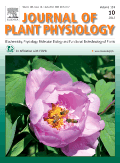
JOURNAL OF PLANT PHYSIOLOGY
Transforming Plant Research into Practical SolutionsJOURNAL OF PLANT PHYSIOLOGY, published by ELSEVIER GMBH, stands as a leading international journal dedicated to the field of plant physiology, agronomy, and crop science. With an impressive impact factor and recognition within the Q1 and Q2 quartiles across various categories, this journal consistently ranks among the top in its field—positioned at #65/516 in Plant Science and #52/406 in Agronomy and Crop Science as of 2023. Located in Munich, Germany, it serves as a vital platform for researchers, practitioners, and students to share groundbreaking insights and advancements. Although it does not currently offer open access, the journal provides an essential repository of knowledge, publishing significant original research, reviews, and discussions on plant function, regulation, and development, thereby shaping the future of agricultural practices and contributing to our understanding of biophysical processes. Researchers looking to publish in a reputable venue or to access cutting-edge studies will find JOURNAL OF PLANT PHYSIOLOGY an invaluable resource.

ACTA PHYSIOLOGIAE PLANTARUM
Driving advancements in agricultural productivity and research.ACTA PHYSIOLOGIAE PLANTARUM, published by Springer Heidelberg, is a leading journal dedicated to advancing the fields of Agronomy, Plant Science, and Physiology. With an ISSN of 0137-5881 and an E-ISSN of 1861-1664, this esteemed publication has a significant global outreach, being based in Germany. The journal is recognized for its impactful contributions, currently holding a Q2 ranking in both Agronomy and Crop Science, as well as Plant Science, and a Q3 ranking in Physiology according to 2023 category quartiles. Its Scopus rankings reflect its reputable standing within the academic community, with notable placements in Agricultural and Biological Sciences, further highlighting its importance for researchers and professionals in the field. The objective of ACTA PHYSIOLOGIAE PLANTARUM is to foster robust discussions and disseminate innovative studies that enhance our understanding of plant physiology and its applications. Though not an open-access journal, it provides comprehensive access options for readers keen on exploring cutting-edge research that drives advancements in agricultural productivity and sustainability. Through its dedication to excellence, this journal continues to be a vital resource for advancing knowledge and practices in plant sciences.

BIOLOGIA PLANTARUM
Pioneering Discoveries in Plant Physiology and GeneticsBIOLOGIA PLANTARUM, esteemed within the realms of horticulture and plant science, is a leading academic journal published by the Academy of Sciences of the Czech Republic, Institute of Experimental Botany. Established in 1959, this journal showcases innovative research and advancements in plant biology, focusing on a spectrum of topics including plant physiology, genetics, and biotechnology. With an impressive Scopus ranking in Horticulture (Rank #41/115) and Plant Science (Rank #221/516), it holds a significant place in the academic community, reflected in its Q2 and Q3 status within its respective categories. Although it is not open access, authors are encouraged to contribute to the growing body of knowledge that supports sustainable practices in agriculture and horticulture. Published in the Netherlands, BIOLOGIA PLANTARUM continues to foster collaboration and dialogue among researchers, professionals, and students dedicated to understanding and advancing plant sciences.

Horticulturae
Exploring the Frontiers of Plant Research.Horticulturae, an esteemed open-access journal published by MDPI, is at the forefront of horticultural science, showcasing innovative research and advancements in the field since its inception in 2015. With its base in Switzerland, this journal operates under the ethos of global accessibility, allowing researchers, professionals, and students to share and disseminate critical findings without barriers. Horticulturae holds a distinguished Q1 ranking in Horticulture and Q2 in Plant Science, as reported in the 2023 categorizations, highlighting its impactful contributions to the scientific community. The journal features rigorous peer-reviewed articles covering a wide range of topics, including plant physiology, crop production, and sustainable practices, making it a vital resource for anyone engaged in gardening, agronomy, and environmental science. As it converges its focus from 2015 to 2024, Horticulturae not only aims to further academic discourse but also aligns with the growing need for research pertaining to biodiversity and sustainable agriculture, thus ensuring relevance in an ever-evolving field.

PLANTA
Elevating botanical research to new heights.PLANTA, published by SPRINGER, stands as a pivotal journal in the field of plant sciences and genetics, known for its rigorous peer-reviewed research that has influenced the advancement of botanical science since its inception in 1925. With an impressive trajectory of convergence from the years 1925 to 1945, and again from 1947 to 2024, this journal maintains a strong reputation, currently categorized in the prestigious Q1 tier of Plant Science and Q2 tier in Genetics as of 2023. The journal is recognized for its high impact, ranked #64 out of 516 in Plant Science by Scopus, representing the top 87th percentile within its category, while also securing a strong position in Genetics with a #92 rank. The journal serves as a critical resource for researchers, professionals, and students who are eager to explore the complex genetics, biochemistry, and evolutionary biology of plants. Though primarily subscription-based, the quality of the research published in PLANTA makes it an essential reading for anyone serious about advancing their knowledge and understanding of plant sciences.
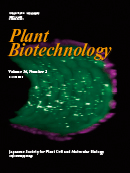
Plant Biotechnology
Transforming Research into Agricultural Excellence.Plant Biotechnology is a distinguished journal published by the Japanese Society for Plant Cell and Molecular Biology, committed to advancing the field of plant biotechnology through the dissemination of high-quality research. With an ISSN of 1342-4580, this journal caters to a global audience interested in agronomy, crop science, and plant molecular biology. The journal has achieved notable rankings, including Q2 in Agronomy and Crop Science and Q2 in Plant Science, underscoring its relevance and impact in these fields according to the latest 2023 metrics. Furthermore, it holds a respectable position within Scopus rankings across multiple categories, indicating its contribution to the academic community. Although it is not an open-access journal, its regular publications, spanning from 1997 to 2024, feature cutting-edge studies that explore innovative approaches and technologies in plant science. Researchers, professionals, and students will find Plant Biotechnology an essential resource for staying informed on significant advancements and trends in plant research.
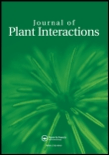
Journal of Plant Interactions
Exploring Ecological Connections Through PlantsThe Journal of Plant Interactions, published by Taylor & Francis Ltd in the United Kingdom, serves as a leading open-access platform dedicated to advancing the understanding of plant interactions and their ecological implications. Established in 2005 and transitioning to open access in 2015, this journal focuses on both fundamental and applied aspects of plant interactions, providing invaluable insights for researchers, professionals, and students within the fields of Ecology and Plant Science. With a commendable impact factor and ranked in the second quartile (Q2) for both Ecology, Evolution, Behavior and Systematics and Plant Science, it reflects the quality and relevance of its published research. Researchers aiming to publish innovative studies on plant behavior and ecosystem dynamics will find a welcoming avenue for their work, as the journal is dedicated to fostering open dialogue and sharing knowledge across disciplines.
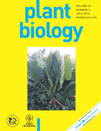
PLANT BIOLOGY
Exploring the Depths of Plant BiologyPLANT BIOLOGY is a prestigious academic journal published by Wiley, dedicated to advancing knowledge in the fields of plant science, ecology, and evolutionary biology. With an impressive impact factor and ranking in the Q1 category for Ecology, Evolution, Behavior and Systematics, and Plant Science as of 2023, it stands at the forefront of research dissemination. The journal encompasses a broad scope of plant biology topics, providing a critical platform for researchers to share innovative findings and foster interdisciplinary collaboration. Available in both print (ISSN: 1435-8603) and online formats (E-ISSN: 1438-8677), it ensures accessibility through open access options. As a crucial resource for professionals, researchers, and students alike, PLANT BIOLOGY cultivates a deeper understanding of plant systems and their ecological significance, making it an essential addition to the library of anyone dedicated to the study of biology and the environment.
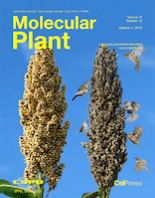
Molecular Plant
Pioneering discoveries at the intersection of biology and agriculture.Molecular Plant, published by CELL PRESS, is a premier journal dedicated to advancing the field of molecular biology and plant science. With an impressive impact factor reflecting its rigorous peer-review process and the high quality of its published research, this journal has achieved a remarkable Q1 ranking in both Molecular Biology and Plant Science categories as of 2023. Its Scopus rankings place it within the top echelons of its field, holding 2nd place in Agricultural and Biological Sciences - Plant Science, showcasing its vital role in disseminating impactful research. The journal covers a broad range of topics, including but not limited to, plant genetics, molecular interactions, and biotechnological advances. Research published in Molecular Plant has the potential to significantly influence agricultural practices and biotechnological applications, making it an essential resource for researchers, professionals, and students eager to stay at the forefront of plant research. Access options for the journal are tailored to accommodate a wide audience, facilitating engagement with cutting-edge findings and breakthroughs. As the field of plant science continues to evolve, Molecular Plant remains integral to fostering innovation and collaboration within the scientific community.

PHYSIOLOGY AND MOLECULAR BIOLOGY OF PLANTS
Enhancing Crop Production with Cutting-Edge ResearchPHYSIOLOGY AND MOLECULAR BIOLOGY OF PLANTS, published by SPRINGER, is a vital journal focused on the advancing field of plant science. Featuring research that spans physiology, molecular biology, and their applications in agriculture, this journal is pivotal for academics, professionals, and students keen on understanding plant processes and enhancing crop production. With an ISSN of 0971-5894 and an E-ISSN of 0974-0430, this journal is recognized for its scholarly significance, ranking in the Q3 category in Molecular Biology, Q2 in Physiology, and Q1 in Plant Science as of 2023. The journal maintains a strong position in the Scopus rankings, with notable percentile rankings including 87th in Plant Science. Established in 2000, this publication aims to foster the dissemination of cutting-edge research by providing a platform for open discussion and knowledge sharing about plant physiology and molecular mechanisms. While it does not currently offer open access options, its comprehensive studies and reviews serve as an essential resource for enhancing our understanding of plant biology.